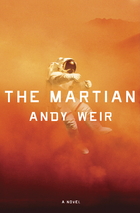Note: I received a free copy of this book from Blogging for Books, in exchange for an honest review.
 I’ve been hearing lots of good things about this book, so I was happy to accept a review copy. Until I realized that there were already more than 5000 reviews on Amazon, and I needed to think of something new to add to the conversation.
I’ve been hearing lots of good things about this book, so I was happy to accept a review copy. Until I realized that there were already more than 5000 reviews on Amazon, and I needed to think of something new to add to the conversation.
Let me start by saying that I wasn’t at all surprised when this book won a GoodReads Choice Award. It offers a compelling story of an astronaut left for dead on Mars, and his struggles for survival. The Martian includes some of the most exciting passages that I’ve read in a long time. It’s not all perfect—especially at the beginning, when I thought the whole book might be from the perspective of one character with no human interaction, I was a little bit worried, but that worry dissipated when we did eventually get to see the reaction of people back on Earth. No matter how compelling the protagonist is, other characters are important.
But rather than giving a detailed survey of the book’s pros and cons, I want to focus on one aspect that I found particularly striking: the language. The vast majority of the book consists of log entries from the stranded astronaut, and their tone and style are unlike any I’ve encountered in a book before. The writing is much more casual and contemporary, basically what I would expect to find in a blog or livejournal, or in regular conversations with my friends. I actually think this is a very good thing; it fits the character perfectly, and his constant snarky remarks made in a normal tone of voice make it much easier to relate to this brilliant scientist.
Some examples, beginning with the first line of the book:
“I’m pretty much fucked.”
“I’ll lose half a liter of water per day to breathing until the humidity in the Hab reaches its maximum and water starts condensing on every surface. Then I’ll be licking the walls. Yay.”
“The guy just plain owned that landing.”
“There’ll be a lot of H20 at the end, but I’ll be too dead to appreciate it.”
“Once I got home, I sulked for a while. All my brilliant plans foiled by thermodynamics. Damn you, Entropy!”
I’ve seen other reviews complaining about the tone, describing it as childish or otherwise unliterary.
And maybe it is childish, but it actually seems perfectly natural to me, and I’m almost 30. This is the way people actually communicate, and it was somehow both surprising and satisfying to see it reflected so well in a book. I want to emphasize that this isn’t text-speak, just a slightly less formal register of English. You would not find expressions like “pretty much”, “fucked”, “yay”, “owned” (in that sense), “too dead”, or “Damn you, [inanimate noun]!” in formal writing.
It’s not that I’ve never seen casual language in a book before, but I’ve never found that the language was so familiar. I guess this is the casual language of educated nerds in their 20s or 30s. It’s not the casual language of valley girls, or the uneducated, or whatever other non-standard language normally appears in books. It’s non-standard in a smart, self-conscious way.
I also think the light tone was absolutely necessary in a book that otherwise includes a lot of logistical calculations and science. I don’t normally read hard science fiction, and in some ways this was harder than I’d like. The casual snarkiness is what made the book readable, and even then I was happy when we sometimes moved away from Mark Watney’s perspective to see the responses of people back on Earth.
Andy Weir has done a lot of interesting things with this book. I realized it’s been a long time since I read a “classic” science fiction novel about space travel, possibly because NASA abandoned its space program a few years ago, so it felt fresh enough just to see a modern take on the issue. Then there’s the matter of language, which again made the book feel very fresh and unique, while also seeming completely natural. Readers who are very opposed to hard science may want to look elsewhere, but if you have a science background yourself, even one that you’ve since abandoned, you’ll probably find a lot to like here. This is a contemporary novel with a very relatable protagonist, who may be a brilliant scientist but also feels completely like one of us. I’ll be happy to read anything else that Weir writes in the future.
No comments:
Post a Comment